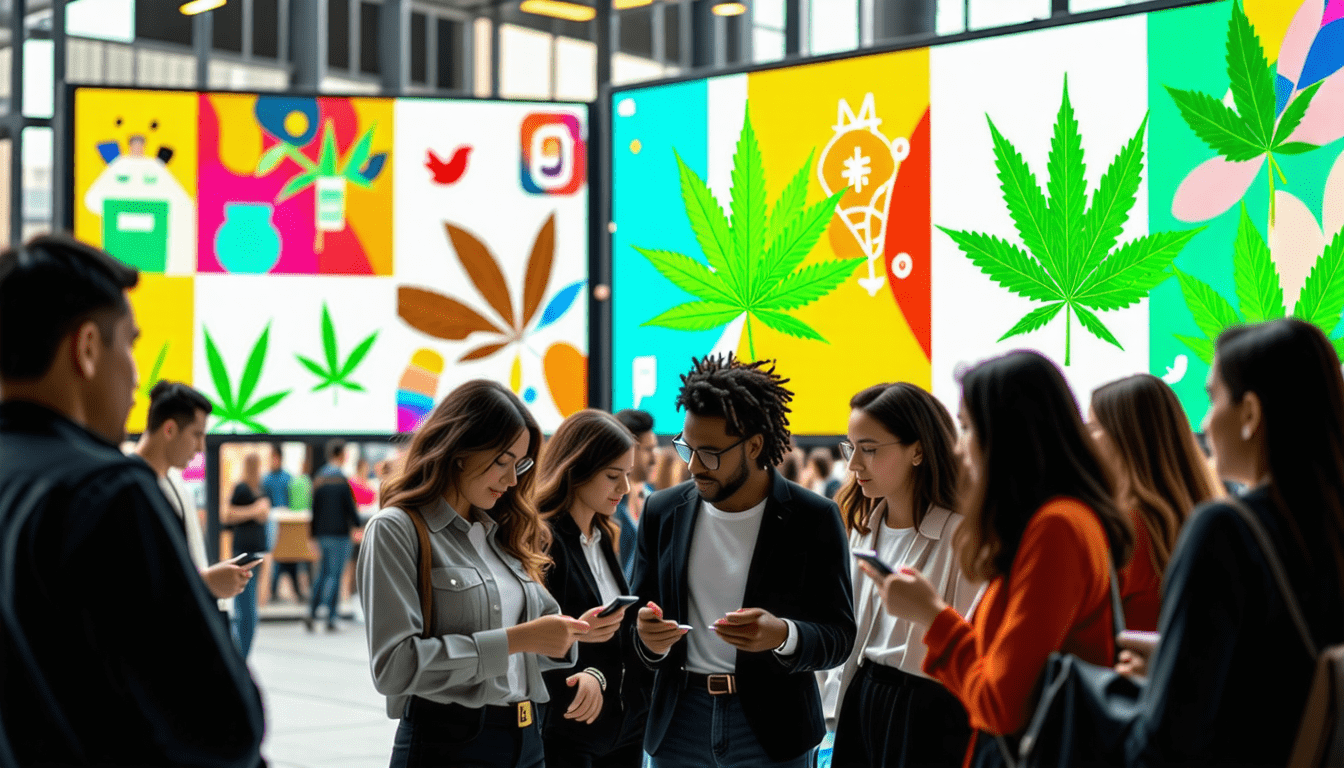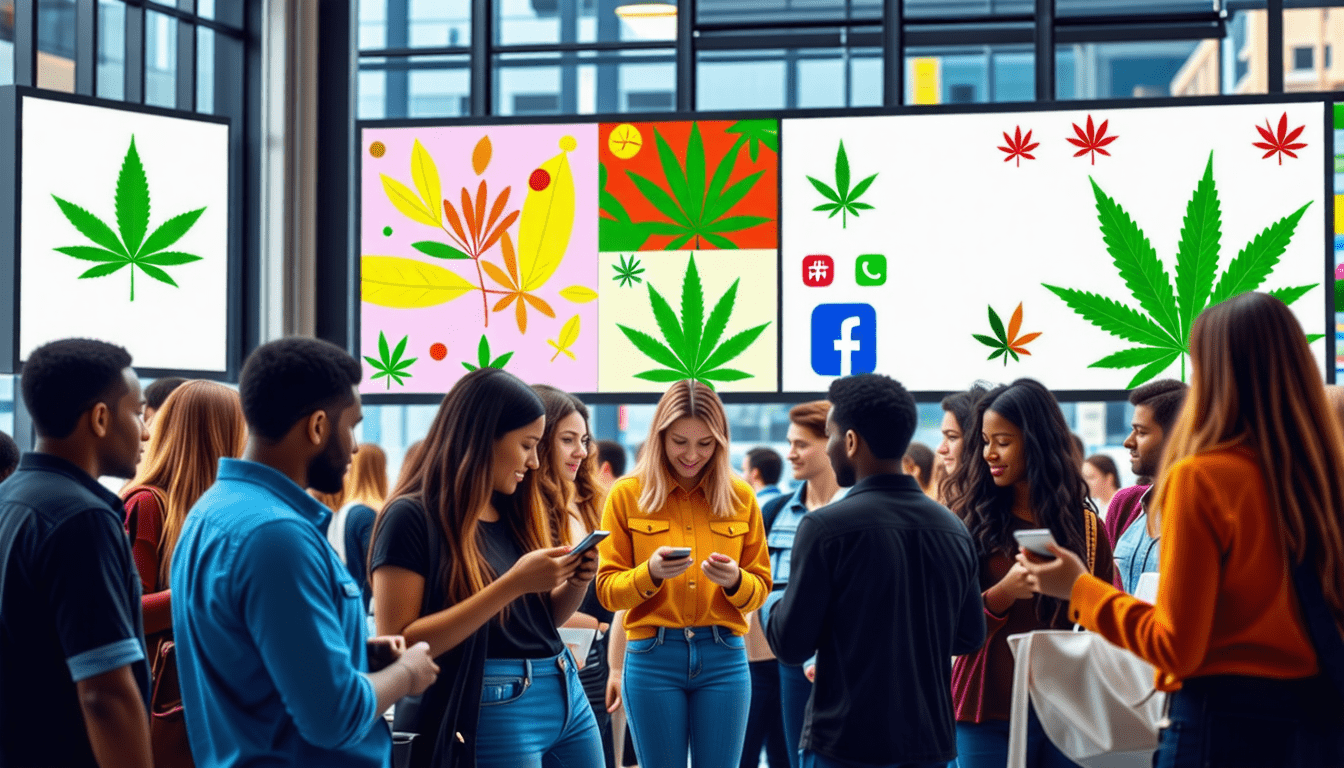Understanding the impact of cannabis social media on public perception
|
IN BRIEF
|
The digital age has ushered in a new era for the cannabis community, transforming how marijuana is perceived across various demographics. As social media platforms burgeon, they serve not only as spaces for connection but also as influential avenues for shaping public perceptions surrounding cannabis. These platforms often amplify discussions regarding the benefits and risks associated with cannabis use, which can normalize attitudes toward its consumption. By analyzing social media content, we can uncover the intricate dynamics between online discourse and societal attitudes, exploring the extent to which social media influences the views of both youth and adults regarding cannabis use, legality, and health implications. In doing so, we gain insights into the ever-evolving relationship between society and this once stigmatized plant, revealing the potential for informed dialogue and education.

The advent of social media has revolutionized how we communicate, share ideas, and shape perceptions. In recent years, the dialogue surrounding cannabis has undergone significant transformation as a result of these platforms. Understanding the impact of cannabis social media on public perception unveils the complexity of societal attitudes towards cannabis use and the potent influence of online communities and messaging.
Social Media as a Catalyst for Change
Social media platforms serve as a catalyst for change, challenging long-held societal norms about cannabis use. By providing a space for open discussion, users can express opinions and share personal experiences, thereby altering the collective consciousness surrounding cannabis. This democratization of information enables a flow of insights that can reshape how people perceive and approach cannabis use.
The Role of Messaging
Crucially, the messaging associated with cannabis on social media significantly impacts public perceptions. Campaigns that frame cannabis as a natural remedy can foster positive attitudes towards its use. For example, content that emphasizes the wellness benefits of cannabis aligns alongside the growing demand for holistic health solutions. These narratives resonate with audiences seeking alternatives to conventional medicine. Discover more about wellness practices involving cannabis here.
Youth Engagement and Norms
Social media’s influence extends to youth engagement, where vibrant communities can form around cannabis culture. This phenomenon has the potential to normalize cannabis use among younger audiences. As youths interact with content that promotes cannabis use as a healthy lifestyle choice, it simultaneously fosters an environment where pro-cannabis attitudes are prevalent. The proliferation of this content can have lasting effects on shaping societal norms concerning cannabis and its associated risks.
The Impact of Influencers
Cannabis influencers play a significant role in shaping perceptions within their communities. When respected figures share their personal experiences or endorse cannabis products publicly, their influence can drive shifts in public opinion, particularly among younger demographics. Understanding this phenomenon sheds light on the marketing strategies employed by the cannabis industry, which increasingly relies on these influencers to connect with audiences authentically.
Exploring Health Benefits
Research and discourse on the health benefits of cannabis have evolved significantly in recent years. As scientific studies unveil the therapeutic potential of cannabis, social media has the power to disseminate this information widely. Many users turn to platforms to seek out natural remedies for conditions ranging from anxiety to chronic pain. This growing body of knowledge has compelling implications for public perception, framing cannabis as a legitimate option for health and wellness. Learn more about natural remedies with cannabis here.
Perceptions of Risk and Availability
The ongoing conversation on social media also influences perspectives on the risk and availability of cannabis. Evaluating social norms around cannabis can reveal contrasting attitudes, especially when comparing various demographics and regions. Insightful research shows that as social media amplifies pro-cannabis sentiment, many individuals begin to perceive cannabis as more accessible and less hazardous, ultimately reshaping public perception.
The landscape of public perception surrounding cannabis is undoubtedly evolving, heavily influenced by the dynamic role of social media. As discussions around wellness, influence, and messaging continue to grow, societal attitudes will likely shift further. The fusion of these factors demonstrates the unique power of social media in redefining how we perceive cannabis in today’s world.
Comparison of Social Media Influence on Cannabis Perception
| Aspect | Description |
| Public Attitudes | Social media normalizes cannabis, fostering more positive public attitudes towards its use. |
| Youth Exposure | Increased visibility of cannabis content can lead to younger audiences adopting pro-cannabis beliefs. |
| Misinformation vs. Science | Balancing scientific evidence with popular content is crucial to shaping informed perceptions. |
| Cannabis Influencers | Influencers play a significant role in shaping narratives and public opinion on cannabis use. |
| Social Norms | Positive exposure through social media alters social norms related to cannabis consumption. |
| Market Trends | Social media insights provide valuable data for understanding cannabis market behaviors and preferences. |
| Public Prevention Efforts | Engaging content can also undermine prevention efforts by appearing supportive of cannabis use. |

Cannabis has transitioned from a controversial substance to a widely discussed topic across various platforms, especially in the realm of social media. This shift has profoundly influenced public perception, shaping not just opinions but also behaviors surrounding cannabis use. A closer examination reveals how social media acts as a dual-edged sword—both normalizing cannabis and raising awareness about its potential risks. In this article, we explore the relationship between cannabis content on social media and its impact on societal attitudes.
The Role of Social Media in Normalizing Cannabis Use
As youth increasingly engage with social media, platforms become a fertile ground for the normalization of cannabis use. Content that portrays cannabis as a healthy lifestyle choice can create an environment where such behaviors are endorsed. This normalization can lead to shifting societal norms and acceptance of cannabis use, ultimately influencing younger generations. Additionally, pro-cannabis messaging often permeates popular culture through memes, influencers, and community discussions, further embedding these attitudes into the public psyche.
Scientific Facts vs. Social Messaging
While positive impressions of cannabis can be prevalent, it’s crucial to counterbalance them with scientific facts. Research indicates that public perception can benefit greatly from accurate information regarding both the benefits and the risks associated with cannabis consumption. By integrating credible data into discussions—be it in infographics, video content, or blog posts—social media can shape a more informed public view, allowing for healthier cannabis discourse.
Influence of Cannabis Advertisements and Promotions
Advertising on social media has a significant impact, particularly on youth perceptions of cannabis use. Exposure to appealing cannabis brands can lead to misconceptions about its safety and accessibility. Many advertisements prioritize the benefits and enjoyment of cannabis without adequately addressing the potential risks involved. This reality underscores the necessity of responsible marketing practices that truly reflect the complexities of cannabis use.
The Importance of Influencers
Cannabis influencers play a pivotal role in shaping public opinion. Their reach can spread both positive and negative perceptions of cannabis. With dedicated followings, these individuals have the power to influence attitudes significantly, acting as both advocates and educators. The way they discuss cannabis can demystify the substance for a larger audience, breaking down barriers and stigmas historically associated with it. For an in-depth exploration of how influencers impact perceptions, check out this insightful article on cannabis influencers.
Holistic Approaches and Wellness Through Cannabis
Incorporating holistic health perspectives, social media frequently highlights the medicinal benefits of cannabis. As content that emphasizes wellness gains traction, audiences become more receptive to viewing cannabis not just as a recreational substance, but as a potential remedy for various conditions. Articles and posts promoting cannabis as a natural alternative for pain relief, such as those detailed in this resource on pain relief therapies, are increasingly prevalent, fostering a more balanced view of its applications.
Understanding the interplay between cannabis social media and public perception is vital in today’s evolving landscape. As engagement with cannabis-related content grows, it’s imperative to consider its implications on societal attitudes and behaviors surrounding cannabis use.
- Influence of Messaging: Analyzes how different types of cannabis messaging shape public opinion.
- Youth Normalization: Examines how social media fosters acceptance and normalization of cannabis among younger audiences.
- Health Perspectives: Discusses how scientific facts presented on social platforms improve cannabis perception.
- Social Norms: Investigates the shift in social norms related to cannabis use due to online discussions and influencer marketing.
- Advertising Impact: Evaluates the effects of cannabis advertising on youth attitudes towards cannabis.
- Community Engagement: Highlights the role of social media in building communities around cannabis culture.
- Influencer Role: Considers how cannabis influencers affect public perception and encourage usage.
- Public Health Campaigns: Utilizes social media for effective youth cannabis prevention strategies.
The rise of social media has revolutionized the way we communicate, share information, and shape societal beliefs. In recent years, the influence of cannabis-related content on these platforms has garnered increasing attention. This article delves into how social media not only reflects public attitudes towards cannabis but also actively shapes and transforms them. By examining the association between social media engagement and perceptions of marijuana use, we aim to uncover the mechanisms through which digital dynamics influence societal beliefs.
The Role of Social Media in Normalizing Cannabis Use
Social media serves as a powerful platform where cannabis culture is both celebrated and scrutinized. Young people, in particular, are highly susceptible to the narratives cultivated in these online spaces. Platforms like Instagram and TikTok showcase a plethora of content that promotes cannabis as not just a recreational substance but also a legitimate part of wellness practices. Such exposure can normalize cannabis use among the youth, creating an environment where casual consumption becomes less stigmatized.
Exploring Youth Attitudes
With the prevalence of pro-cannabis narratives online, it’s crucial to explore how these messages influence youth attitudes. Research indicates that adolescents who engage with cannabis content on social media are more likely to develop permissive attitudes toward use. The blending of cannabis with themes of healthy living and alternative medicine presents it in a socially acceptable manner, often overshadowing associated risks. Understanding these patterns can help inform cannabis prevention programs aimed at young audiences.
Influencers and Cannabis Messaging
The presence of cannabis influencers shapes public perception significantly. These figures often curate a lifestyle associated with cannabis that emphasizes its benefits while downplaying potential drawbacks. This skewed representation can affect the collective understanding of marijuana use, especially among impressionable followers. Given their reach, influencers play a vital role in disseminating information, often promoting messages that can lead to altered perceptions of cannabis safety and legitimacy.
Scientific Information vs. Social Narrative
While social media can perpetuate myths, it can also serve as a vehicle for sharing scientific facts. Campaigns that leverage social media to provide evidence-based information about cannabis can counteract misinformation. By introducing a balanced view that includes potential benefits alongside risks, stakeholders can aid in developing a more nuanced understanding of cannabis among the public. The challenge lies in effectively cutting through the noise of pro-cannabis content to reach a wider audience face-to-face with factual information.
Impact on Public Perception and Policy
As public attitudes toward cannabis evolve predominantly due to online content, implications for policy and legislation emerge. Perceptions shaped by social media can influence support for cannabis legalization and acceptance of its medicinal use. Continuous research into these trends is crucial, as policymakers must recognize the power of social media narratives in shaping public discourse. Understanding this relationship can guide the formation of regulations that consider both the cultural significance of cannabis and its associated risks.
The Need for Responsible Engagement
To capitalize on the positive aspects of cannabis social media while mitigating drawbacks, a strategy for responsible engagement is essential. Stakeholders—including health advocates and regulators—should promote authoritative, evidence-based resources on these platforms. Creating partnerships with trusted influencers can also aid in spreading accurate information and countering harmful myths that may arise within cannabis conversations. By fostering a well-informed public, we can enhance the societal understanding of cannabis and its implications.


Post Comment